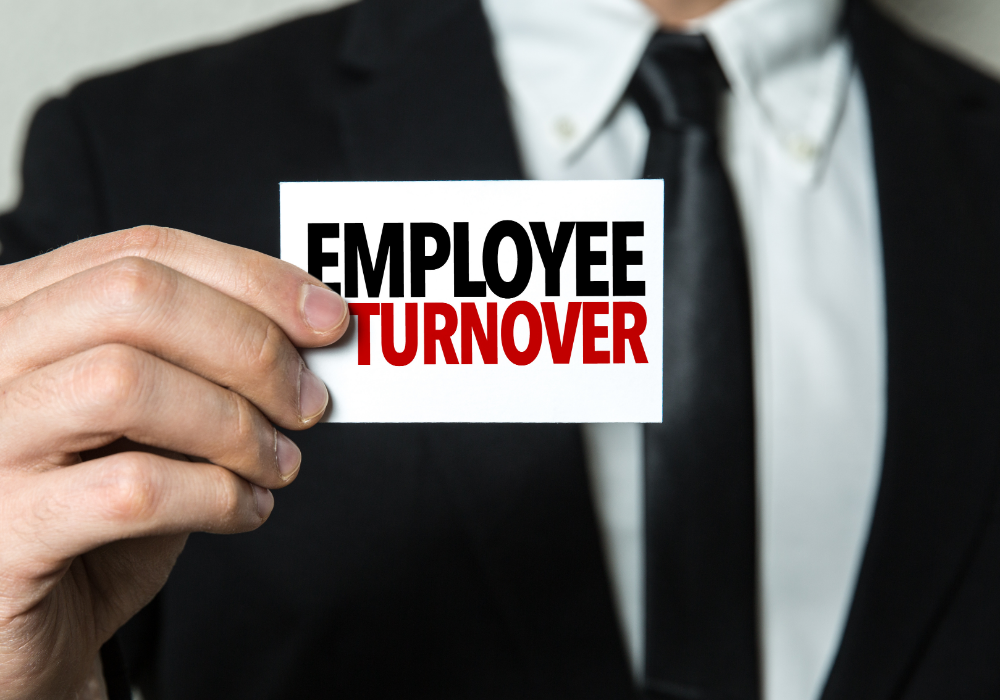The signs have been there for years; now they’re impossible to ignore.

For a while, it was easy to brush off the warning signs. Burnout was just a bad week, quitting quietly felt like a personal choice, and endless exhaustion could always be blamed on a tough season. But those cracks in the system have only deepened. What used to feel like isolated problems are now linked, tangled together into something bigger—and much harder to deny.
Workers everywhere are stretched thin, checked out, or fed up entirely. Productivity is crashing, trust in leadership is disintegrating, and the old promises of stability and growth feel emptier than ever. This isn’t just about long hours or difficult bosses anymore. It’s about a culture that’s collapsing under the weight of its own pressure. The signs have been flashing for years, but now they’re too loud, too clear, and too urgent to overlook.
1. Burnout has gone from common to constant.

What used to be an occasional rough patch is now the baseline. Burnout has quietly slipped from being a temporary dip to an ongoing condition that people carry with them daily. Deadlines never end, expectations keep climbing, and the recovery time workers once relied on has all but disappeared.
Carlos Santiago-Torner in National Library of Medicine highlights that chronic burnout reduces concentration, motivation, and productivity, making it harder for workers to stay engaged and effective. People go through the motions, but the spark that made them care has dimmed. Rest doesn’t feel restorative anymore because the system demands too much too fast. When burnout stops being the exception and starts becoming the norm, it’s not just a personal issue—it’s a clear sign the entire work culture is on the edge of collapse. No one can run on empty forever, and across industries, that breaking point feels closer every day.
2. Layoffs feel like business as usual.

What used to be a rare corporate disaster has turned into a routine announcement. Layoffs no longer shock anyone—they’re expected, sometimes even scheduled, like part of a business cycle. Employees watch coworkers disappear overnight while being told to “stay positive” and “focus on growth.”
Benjamin Laker in Psychology Today notes that repeated layoffs damage organizational trust, leaving employees feeling disposable and anxious about their future. Teams shrink, workloads balloon, and survivors carry the weight of uncertainty while fearing they’re next.
It’s impossible to build loyalty or long-term goals in a culture that treats workers as disposable. When layoffs become standard practice, it signals a company—and an economy—that’s running on fear, not stability. People stop investing in their roles because the company has already stopped investing in them.
3. Quiet quitting has morphed into full-blown disengagement.

At first, quiet quitting looked like a subtle rebellion: do your job, meet expectations, but refuse to go above and beyond. It was a way to reclaim boundaries without walking away entirely. But now, that quiet resistance is turning louder. Workers aren’t just pulling back effort—they’re mentally checking out altogether. Meetings feel emptier, collaboration breaks down, and even basic enthusiasm disappears. It’s not laziness; it’s self-preservation.
Gabriella Chavarin for Modern Health explains that quiet quitting is a response to burnout and a lack of recognition, where employees disengage mentally and emotionally, not just physically. This widespread withdrawal leaves teams scattered and goals unmet, and leaders scrambling for answers they should’ve seen coming. Disengagement isn’t a phase—it’s a warning flare that the workplace is no longer holding people’s energy, focus, or hope.
4. Management is losing its grip on trust.

The gap between leadership and employees has never felt wider. Promises of flexibility, fairness, or future promotions ring hollow in workplaces where actions consistently betray words. Leaders ask for trust while delivering layoffs, push toxic productivity, and ignore worker burnout until it explodes.
When trust erodes, everything else follows. Communication breaks down, transparency vanishes, and workers stop believing anything management says—even when they genuinely try. Without trust, even the best intentions fall flat. People assume the worst because they’ve been burned too many times before. Leadership’s growing disconnect from day-to-day realities is more than a PR problem; it’s a foundational crack in the culture. And once trust is gone, rebuilding it is painfully slow—if it happens at all.
5. Toxic positivity is masking real problems.

Smiles in the all-hands meetings. Motivational posters in the breakroom. Corporate catchphrases like “hustle harder” or “good vibes only.” These surface-level boosters are supposed to inspire, but they end up doing the opposite. Workers see right through forced positivity when the reality beneath it is crumbling.
Toxic positivity shuts down honest conversations about stress, burnout, and job insecurity. Instead of addressing problems head-on, companies try to wallpaper over them with empty slogans. This creates a dangerous disconnect between what people experience and what they’re told to feel. When the gap between lived reality and corporate messaging grows too wide, resentment festers. Workers tune out, dismissing any attempt at morale-boosting as hollow noise. It’s a sign that leadership has stopped listening—and that the culture is too fragile to handle the truth.
6. Productivity paranoia is infecting leadership.

The push for constant output has spiraled into full-blown paranoia. Leaders monitor keystrokes, track logins, and demand visibility into every task, convinced that if they can’t see the work happening, it isn’t happening at all. But surveillance doesn’t build trust—it destroys it. This obsession with monitoring undermines autonomy and signals a lack of faith in employees.
Workers respond by disengaging further, performing just enough to avoid scrutiny but never enough to actually feel invested. Creativity dies in an atmosphere of constant observation, and problem-solving takes a back seat to performative busyness. Productivity paranoia doesn’t lead to better results—it accelerates the collapse of culture by eroding the very trust and freedom people need to do their best work.
7. Endless availability is turning workers into machines.

The boundaries between work and life have blurred beyond recognition. What started as checking emails after hours has become an expectation to be constantly reachable. Pings, alerts, and last-minute requests creep into evenings and weekends until personal time feels like an illusion.
This erosion of downtime chips away at mental health and long-term motivation. People feel chained to their devices, fearing missed messages could mark them as disengaged or uncommitted. But nonstop availability doesn’t boost productivity—it drains it.
Creativity fades, burnout deepens, and resentment builds beneath the surface. When companies expect workers to be “always on,” they forget that people aren’t machines. Humans need time to rest, disconnect, and think freely. Without it, the work suffers, and so does the culture holding it together.
8. High turnover is gutting teams before they can rebuild.

In a healthy work culture, employees stick around long enough to grow, collaborate, and build something meaningful. But right now, workers are walking out faster than companies can replace them. High turnover isn’t just a staffing issue—it’s a flashing red light for deeper dysfunction.
Every departure drains institutional knowledge and leaves remaining staff scrambling to cover gaps. Morale sinks as workloads pile up, and new hires enter chaotic environments without proper support. The cycle feeds itself: the more people leave, the harder it is to hold onto those who remain. Instead of asking why teams are falling apart, many leaders blame external forces or “poor fit,” ignoring the toxic conditions driving people away. Turnover at this scale signals a culture in freefall, one where stability feels permanently out of reach.
9. Overwork is mistaken for dedication, and it’s backfiring.

Too often, working late and sacrificing weekends are praised as signs of commitment. Employees who push themselves to exhaustion are held up as role models, while anyone setting boundaries risks being labeled as unmotivated. But glorifying overwork isn’t a long-term strategy—it’s a slow-motion collapse.
When exhaustion is rewarded, rest becomes a liability. People push through illness, skip vacations, and let their personal lives erode under the pressure to prove themselves. The short-term gains of squeezing out extra hours pale in comparison to the long-term costs: rising absenteeism, mental health struggles, and mass burnout. Eventually, even the most dedicated workers hit a wall. Praising overwork doesn’t fuel success—it drains it, leaving teams hollowed out and cultures beyond repair.
10. Pretending “business as usual” is working is costing companies everything.

Despite mounting problems, many companies cling to the illusion that business can carry on as it always has. They recycle outdated policies, push aggressive growth goals, and pretend employee dissatisfaction is just a phase. But ignoring reality doesn’t stop the collapse—it accelerates it. By refusing to adapt, companies alienate their workers and miss opportunities for meaningful change. Employees grow cynical, assuming leadership is either clueless or indifferent. Motivation crumbles when workers see their concerns brushed aside in favor of maintaining appearances.
Culture isn’t saved by pretending nothing is wrong—it’s saved by facing problems head-on. Without honest reflection and real action, the façade of “business as usual” will crack wide open, taking what’s left of workplace trust with it.
11. Workers are done waiting for change and walking away entirely.

There comes a point when people stop hoping things will improve. Across industries, that point has arrived. Workers are no longer quietly waiting for raises, recognition, or better conditions. They’re leaving—not for marginal improvements, but for entirely new paths that feel more sustainable and fulfilling.
This isn’t just about finding another job. Some are switching industries, starting their own ventures, or leaving traditional employment altogether. They’ve recognized that loyalty to a broken system won’t fix it. As workers reclaim their time, energy, and ambitions, they leave behind cultures that refused to listen. And once they’re gone, it’s nearly impossible to rebuild the trust that was lost. The final warning sign isn’t a memo or a headline—it’s the growing number of people who refuse to play along any longer.
